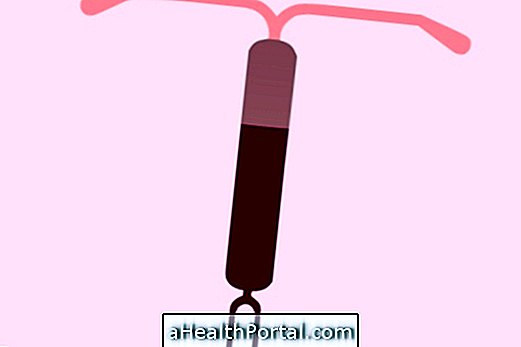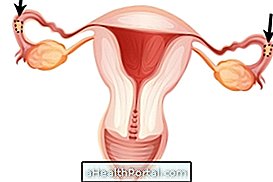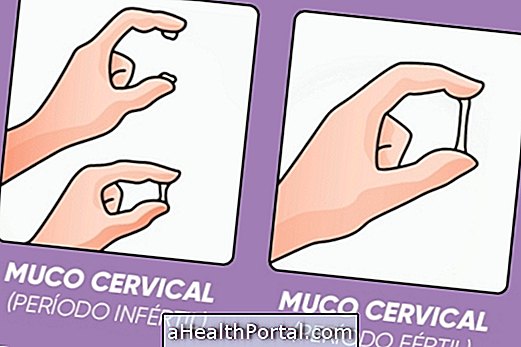The morning-after pill is an emergency contraceptive method, used only when the usual contraceptive method fails or is missed. It may be composed of levonorgestrel or ulipristal acetate, which works by delaying or inhibiting ovulation.
Levonorgestrel-containing pills may be used within 3 days after intimate contact and ulipristal acetate-containing pills may be used up to 5 days after unprotected intercourse, however, their efficacy decreases as the days go by and so they should be taken as soon as possible. They can be purchased at pharmacies and the price can vary between 7 and 36 reais, depending on the active substance used.

How it works
The morning-after pill works by inhibiting or delaying ovulation, making it difficult for sperm to enter the uterus and possibly for oocyte maturation. In addition, it can change hormone levels after ovulation, but it may also work in other ways.
Emergency oral contraception has no effect after implantation has been completed, and does not interrupt an ongoing pregnancy in these cases.
When and how to take
The morning-after pill should be used in emergencies where there is a risk of an unwanted pregnancy and can be taken in situations such as:
- Sexual intercourse without a condom or condom disruption. Check out other care you should have when having sex without a condom;
- Forgetfulness of taking the regular contraceptive pill, especially if forgetfulness occurred more than once in the same card. Check also the care after forgetting to take the contraceptive;
- Expulsion of the IUD;
- Displacement or removal of the vaginal diaphragm prematurely;
- Cases of sexual violence.
For pregnancy to be avoided, the morning-after pill should be taken as soon as possible after unprotected intimate contact or failure of the regularly used contraceptive method.
This pill can be taken on any day of the menstrual cycle, and may be taken with water or food. Each carton contains only 1 or 2 single-shot tablets.

Possible side effects
After use, the woman may feel headache, feeling sick and tired and after a few days she may also notice symptoms such as:
- Breast pain;
- Diarrhea;
- Small vaginal bleeding;
- Anticipation or delay of menstruation.
These symptoms are related to the side effects of the medication and it is normal for menstruation to become unregulated for some time. The ideal is to observe these changes and if possible note the characteristics of menstruation in the calendar or on the cell phone, so that you can show the gynecologist in a consultation. Learn more about the side effects of the morning after pill.
8 Common Questions About the Next Day Pill
Many questions may arise about the morning after pill. Some of the most common are:
1. Can I get pregnant even if I take the morning-after pill?
Although indicated to prevent unwanted pregnancy, the morning-after pill is not 100% effective if taken within 72 hours of sexual intercourse. But when it is taken on the same day, it is unlikely that the woman will become pregnant, however, there is such a possibility.
The sensible thing to do is wait a few days until the onset of menstruation, and in case of delay you can do a pregnancy test that you buy at the pharmacy. Here are your chances of being pregnant by responding to this online test:
- 1
- 2
- 3
- 4
- 5
- 6
- 7
- 8
- 9
- 10
Find out if you are pregnant
Start the test


- Yes
- Not

- Yes
- Not

- Yes
- Not

- Yes
- Not

- Yes
- Not

- Yes
- Not

- Yes
- Not

- Yes
- Not

- Yes
- Not

- Yes
- Not
2. Does the morning-after pill delay menstruation?
One of the side effects of the morning after pill is the change in menstruation. So after taking the pills, menstruation can occur up to 10 days before or after the expected date, but in most cases, menstruation occurs on the expected date with a change of about 3 days or more. However, if the delay persists, you should take the pregnancy test.
3. Does the morning-after pill abort? How it works?
The morning after pill does not abort because it may work in different ways, depending on the stage of the menstrual cycle in which it is used, and may:
- Inhibit or delay ovulation, which avoids the fertilization of the ovum by the spermatozoid;
- Increase the viscosity of the vaginal mucus, making it difficult for the sperm to reach the egg.
Thus, if ovulation has already occurred or if the ovum has already been fertilized, the pill does not prevent the development of the pregnancy.
4. How many times can I use it?
This pill should only be used sporadically because it has a very high hormonal dose. Also, if the woman takes the morning-after pill more than once a month, it may lose its effect. Therefore, this medicine is only indicated for emergency situations and not as a frequent contraceptive method. See which method of avoiding pregnancy is right for you by clicking here.
5. Does the morning-after pill hurt?
This pill will only do badly if it is used more than 2 times in the same month, which increases the risk of diseases such as breast cancer, uterine cancer, problems in a future pregnancy, and may also increase the risk of thrombosis and pulmonary embolism, example.
6. Does the morning-after pill cause infertility?
There is no scientific evidence that sporadic use of this pill can cause infertility, malformation of the fetus or ectopic pregnancy.
7. Does the morning-after pill change the contraceptive function?
No, so the contraceptive pill should continue to be taken regularly, at regular times, until the end of the chart. After the end of the chart you should wait for the menses to come down and in case the menses do not go down, you should consult your gynecologist.
8. Does the morning-after pill work during the fertile time?
The fertile period is the time of the menstrual cycle in which fertilization is most likely to occur. This period starts about 72 hours before ovulation, which is the average life span of a sperm, and ends about 24 hours later, which is the average life time of an egg.
9. Does the morning-after pill take effect if unprotected intercourse occurs after taking it?
No. The morning after pill is not a contraceptive method and should only be taken in emergency situations. If the person has already taken a morning-after pill as a method of emergency and has unprotected sex the day after the pill, there is a risk of becoming pregnant.
Ideally, the woman should talk to her gynecologist and start taking a contraceptive.
Watch the following video and learn how to calculate the fertile period:

Thus, the morning-after pill is only effective if ovulation has not yet occurred during the first days of the fertile period. If fertilization has already occurred, if there is intimate contact, a pregnancy is very likely to occur.
Names of pills the next day
The morning after pill can be bought at pharmacies and also on the internet, without a prescription being required. Some trade names are Diad, Pilem and Postinor Uno. The pill that can be used up to 5 days after unprotected intercourse is Ellaone.
However, although it can be bought without a prescription, this medicine should only be used under medical advice.























